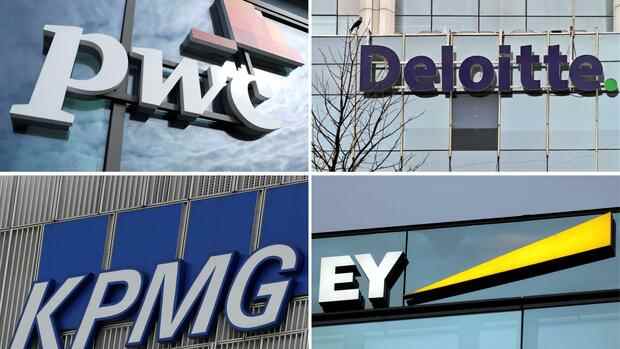Dusseldorf The four major auditors in Germany have so far largely unscathed the corona period and are emerging stronger from the pandemic year 2021. At the moment, business is already growing at double-digit rates, especially in management consulting, according to the “Big Four”. These include the companies PwC, EY, KPMG and Deloitte.
On Monday, KPMG and EY, the last two major audit firms, presented their results. In the case of EY, which was heavily burdened by the Wirecard scandal, there was a slight decline in sales of 1.5 percent to 2.1 billion euros.
However, this was due to one-off pandemic effects, without which EY would have grown slightly in the financial year that ended at the end of June. It was precisely in the auditing division, which is under public attack, that EY grew the most with six percent growth compared to the other divisions.
Corona special effects were also evident in the other “Big Four”. During the pandemic, the consultants hardly traveled to customers and switched to virtual work. The travel expenses otherwise billed to clients were not included in sales and thus led to declines, although the volume of orders itself remained stable.
Top jobs of the day
Find the best jobs now and
be notified by email.
Number three industry, KPMG, has coped best with the pandemic, according to the numbers. Board spokesman Klaus Becker said on Monday that he was extremely satisfied with the financial year that ended at the end of September. Sales increased by three percent to 1.99 billion euros. As with EY, this result is unadjusted, i.e. including the negative Corona special effects.
At KPMG, there was a clear shift from the traditional audit to the consulting business. For a long time, the company dominated the final exam in the Dax, but compared to the “Big Four” it has to surrender most mandates because of the legally required rotation.
In the past financial year, this led to a decline in sales of four percent to 634 million euros in the classic auditing business. KPMG has lost major mandates such as that of Deutsche Bank with a fee of 58 million euros alone. Most recently Commerzbank and Puma were newly won.
The company approaches the companies that KPMG is no longer allowed to audit as a consultant – apparently with success: The consulting division increased by nine percent to 773 million euros in 2020/21. KPMG is growing much faster than its competitors in this business. However, they ended their financial year in June. Therefore, more crisis months from 2020 and fewer growth months from this year are included in the results.
ESG issues are becoming a major growth driver
In addition to classic topics such as digital transformation and cybersecurity, KPMG customers primarily booked sustainability services. The so-called ESG topics are proving to be the new growth driver for all large audit firms. It is about environmental protection, diversity in management and good corporate governance. The audit firms are involved in several areas.
Numerous companies are already preparing elaborate sustainability reports that are signed off by their auditors. From the 2023 financial year, these reports will be mandatory for an estimated 15,000 German companies – this is what a draft EU directive provides. For customers who do not check them, the companies act as consultants for the measurement, analysis and controlling of sustainability indicators and help shape the strategies.
The “Big Four” are expanding this business more and more. KPMG will invest around 1.5 billion euros in the ESG business worldwide over the next three years, primarily in technology and specialists. PwC is currently building global competence centers on important ESG topics such as climate, sustainability risks and supply chains.
In Germany, PwC was able to defend its market leadership. The company achieved sales of around 2.35 billion euros in 2020/21, around one percent more than in the previous year. However, the travel expenses not incurred due to the corona are fictitiously included in this. If you take the unadjusted figures, there is a slight decrease in a similar order of magnitude as for EY.
KPMG boss Becker thinks little of including fictitious travel expenses in the balance sheet. “We can’t foresee how much we’ll travel in the future,” he said. During the pandemic, virtual collaboration with customers worked well for all consulting firms. Project work via video conference has established itself.
The number four Deloitte relies heavily on virtual collaboration with customers and assumes that the travel costs invoiced will remain permanently lower. At Deloitte, the effect led to an eight percent decline in sales in the fiscal year ended June.
Numbers show no loss of confidence in EY
At EY, on the other hand, a different picture emerges than at KPMG: The company grows most strongly in the final examination, while in consulting, sales fell by seven percent due to the corona effects described. A loss of confidence in EY because of the allegations of inadequate testing by the scandal group Wirecard cannot be read from the figures.
“Thanks to the acquisition of a number of large mandates, among other things, we are consistently very well utilized in auditing,” said Jean-Yves Jégourel, Co-Chairman of EY in Germany, on Monday.
It is true that EY lost Deutsche Telekom’s important mandate in the wake of the Wirecard scandal. But Deutsche Bank recently stood behind EY and wants to continue to mandate the company as auditor. The general meeting will decide on this.
EY expects sales growth in the mid-single-digit percentage range for the current financial year. KPMG boss Becker did not want to make a specific forecast, even with a view to possible new restrictions in the wake of the corona pandemic. But he let it be known that, as with the “Big Four”, the consulting units in-house are currently booming and growing at double-digit rates.
More: Less sales and travel, more returns: How Deloitte is coping with the pandemic
